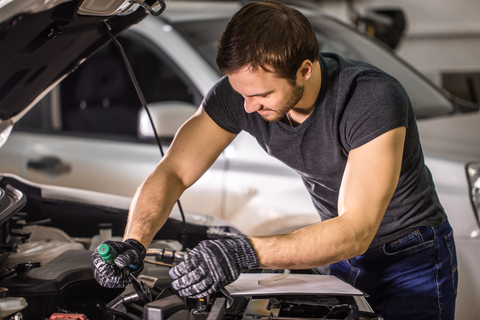Save gas, improve power with fuel system upkeep

Your car had plenty of horsepower ever since you drove it away from the dealer's lot. Lately, however, you notice that it doesn't accelerate promptly and fuel economy has dropped.
"It could be your fuel injection system," said Tony Molla, vice president of communications at the National Institute for Automotive Service Excellence and author of Chilton's Electronic Engine Controls Manual, one of the first professional service manuals covering fuel injection technology. "Dirt particles can clog the tiny valve inside your vehicle's fuel injectors and reduce performance noticeably."
Fuel injection systems replaced traditional carburetors in most production vehicles beginning about 1990. They eliminated the need for what up until then was a complicated and inefficient way to squirt gas into the engine.
Controlled by the vehicle's electronic system, fuel injection delivers excellent fuel economy and performance. A precise amount of gas is sprayed into the engine through a pinhole, which atomizes the fuel. The entire fuel injection system is pressurized for efficiency.
Driving conditions such as dirty city air or dusty country roads, along with normal carbon buildup, can clog spray valves in any fuel injection system, Molla said. In most cases, however, fuel injection systems can operate fine for up to 100,000 miles or so.
For new cars or vehicles with fewer than 100,000 miles, Molla suggested looking at other culprits first. For instance, air cleaners can get filled with dirt or pollen and often need replacing twice a year.
"Fuel system problems should be handled by professional technicians," Molla said. "An untrained mechanic may accidentally spray themselves with gas or, worse, cause an explosion."
Here are some suggestions from the National Institute for Automotive Service Excellence for vehicles having problems with acceleration or fuel economy:
-
Change your car's air filter at least once or perhaps twice a year depending how much and where you drive. This helps prevent microscopic particles from entering the engine.
-
Get the fuel filter inspected according to the manufacturer's recommended maintenance schedule. A dirty fuel filter can contribute to clogs in your vehicle's fuel injection system.
-
Vehicles with more than 100,000 miles may need their fuel injection systems cleaned professionally. Check with your maintenance guidelines. Also, don't try to clean the system yourself—remember, it's under pressure and you need to know how to release that pressure safely for service.
-
Bad fuel injectors are usually replaced, not overhauled.
-
Buy quality gasoline from a reputable station. Old tanks may contain rust particles or other contaminants that can clog the fuel system in your car.
"Fuel injection systems became popular because they last a long time and are usually maintenance free up to at least 100,000 miles," Molla said. "Although extremely reliable, they contain a few important parts that need inspection periodically to keep your operating at peak performance."